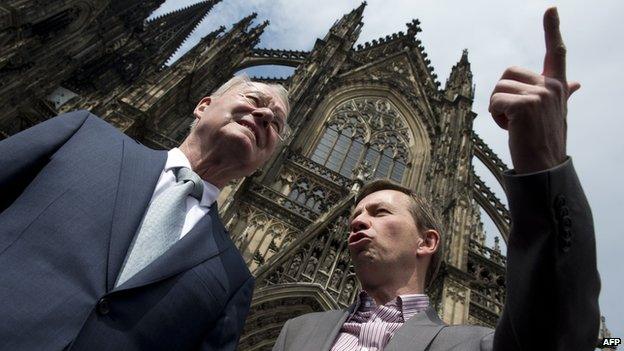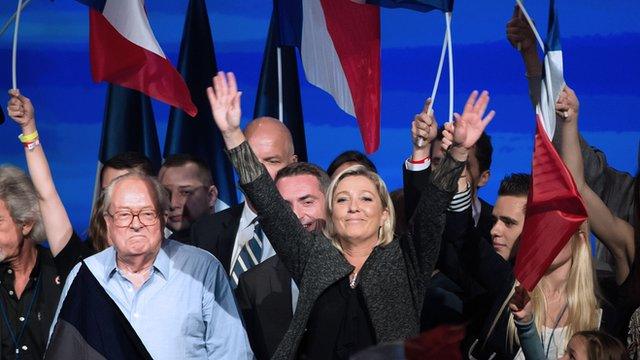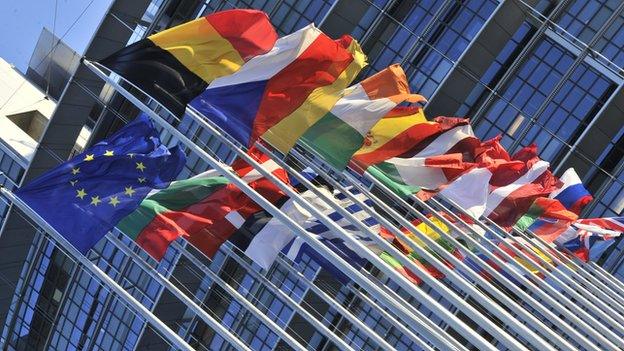German Euroscepticism - a milder variety
- Published
- comments
Gavin Hewitt reports on the Eurosceptic parties in Germany
Beneath the blackened Gothic spires of Cologne Cathedral and the angels high in the architecture was a small tented stage.
A 51-year-old economics professor talked to a passing Saturday afternoon crowd. There was nothing strident about him; it was like listening to a college lecture on why the euro was bad for Germany and for Europe.
This is German Euroscepticism. Its political face is the party AfD, Alternative fuer Deutschland. It is a young party which nearly polled 5% of the vote at the German election last year - the threshold for getting seats in the Bundestag.
The hurdle is lower for the European elections at the end of this month - and quite possibly the AfD will end up with five or six MEPs.
Germany is not fertile ground for Euroscepticism. After the war Germany firmly anchored its identity in being European. The political class is strongly behind the EU which, they believe, has enabled Germany to escape the weight of its history.
The eurozone crisis gave Euroscepticism an opening. At the birth of the euro there were guarantees that states would not have to take on the debts of others. In the heat of the crisis Germany backed bailouts for Greece, Ireland and Portugal. But the fear took root that the European Union was becoming a transfer union, with hard-earned German money propping up weaker southern nations.

Cologne: The AfD's leaders shun Eurosceptic parties in neighbouring countries
Anti-euro mood
So the AfD was launched, mainly by academics who argued that the euro was bad for Germany and divisive.
Austerity and internal devaluations - the prescribed medicine for vulnerable economies - sowed resentment. (In Italy the current Forza Italia campaign slogan is "More Italy, Less Germany.") The AfD quickly found an audience in a country where around 30% of people remain nostalgic for the Deutschmark.
Some cite the emergence of the AfD as further evidence of an anti-establishment US-style "Tea Party" mood sweeping Europe. It is and it is not. Firstly the party is not anti-EU. Its leader Bernd Lucke firmly rejects any alliance with Nigel Farage and UKIP, a party campaigning to withdraw from the EU. The leaders of AfD shun any link with the parties of Marine Le Pen in France or Geert Wilders in the Netherlands.
And yet, as the eurozone crisis has eased, the party, like others, has campaigned for much tighter controls on immigration and the removal of illegal migrants. It prompted a small protest in Cologne. One passer-by told us "it's a right-wing party in disguise; I don't like it".
The danger for any Eurosceptic party in Germany is that it is quickly branded right-wing or extreme.
Merkel upbeat
Chancellor Angela Merkel has been campaigning for the European elections this week.
On Monday she was in Ingolstadt. Her message was upbeat. We have passed through a difficult phase, she told the crowd. The euro had won back a good slice of self-confidence. It had been hard times for the currency, but other countries had to play their part in getting economically fit again. Germany offered solidarity, but only if other countries made an effort. Solidarity and responsibility were two sides of the same coin, she said.
I spoke to David McAllister, a former PM of Lower Saxony - a Conservative politician on the rise and of Scottish descent - who reckoned that more than 90% of the votes cast would be for pro-EU parties. There may be dislike of Brussels overreaching itself, but Germany remains solidly committed to the EU.
The think-tank Open Europe has calculated that anti-establishment parties (like the AfD) could win 31% of the vote across Europe, giving them 218 out of 751 seats.
It is most unlikely that such disparate groups would work together, but if they commanded nearly a third of the vote -and the turnout was low - would Europe's leaders and officials just ignore the votes of the disaffected? Would they continue as if nothing had happened, or would they pause and question why so many voters seem so disenchanted with the European project?
As in Germany, a convincing majority of voters will support pro-EU parties. That is not in doubt, and if the past is a guide, the European establishment will simply continue with its project towards ever closer union. But a strong anti-establishment vote will weaken the argument for further EU integration.
- Published13 November 2013

- Published16 October 2013
- Published25 February 2014
